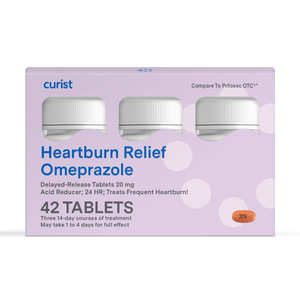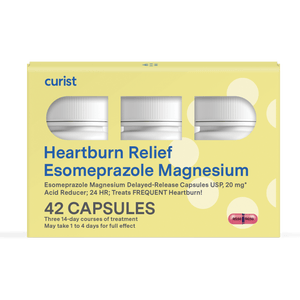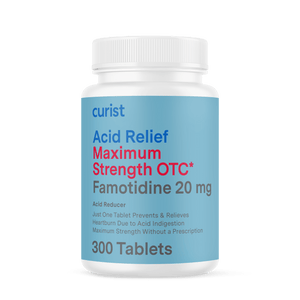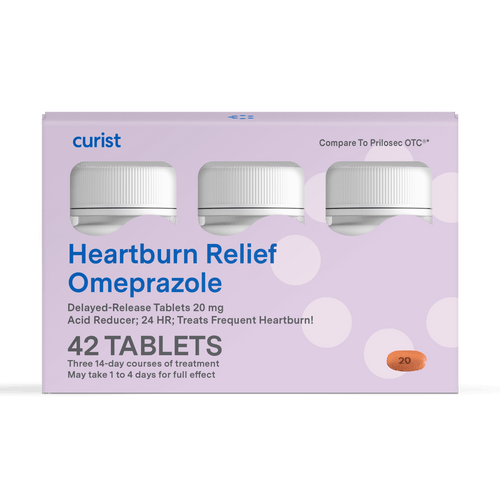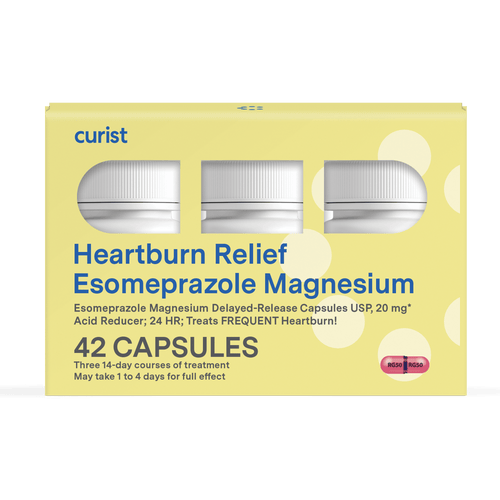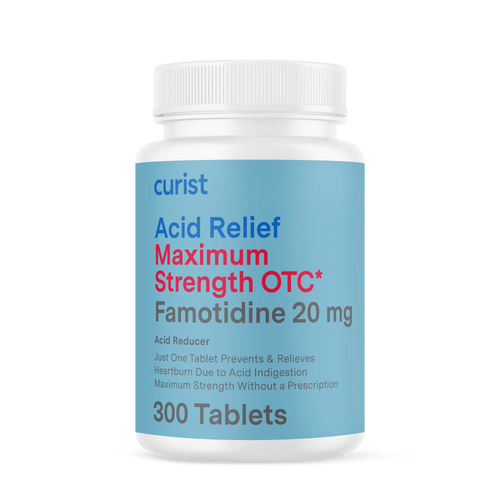By Cindy Diep, The University of Texas at Austin College of Pharmacy
Curist delivers medicines to your door at a fraction of the price of traditional brands. We hope everyone stays safe and healthy during this time.
Have you seen both famotidine and omeprazole in the heartburn relief aisle and wondered about the differences between these medications? You’re in luck because Curist is here to answer some questions!
Are Famotidine and Omeprazole the Same Thing? How are Omeprazole and Famotidine Similar?
Famotidine and omeprazole are not the same thing, although both belong to classes of drugs used to treat heartburn by reducing stomach acid. Despite having different mechanisms, both drugs are commonly used for conditions like ulcers, heartburn, and gastroesophageal reflux disease (GERD). The length of therapy for over-the-counter (OTC) famotidine and omeprazole is two weeks or less and should not be used long-term without a healthcare provider’s approval.
What are the Differences Between Famotidine vs Omeprazole?
Although both famotidine and omeprazole can be used to treat heartburn, there are several differences between famotidine and omeprazole.
Famotidine is an H2 (histamine-2) receptor antagonist, which interferes with the production of stomach acid by binding to and blocking the histamine type-2 receptor of parietal cells (which aid with food digestion). OTC famotidine is used more often for mild, infrequent heartburn and can be used for both treatment and prevention. In addition, famotidine is better for controlling nighttime symptoms. Compared to omeprazole, famotidine has a quicker onset and patients will see a faster relief of symptoms. However, the medication has a shorter duration of action and can be taken up to twice a day to maintain its effects.
Omeprazole is a proton-pump inhibitor, which blocks the pumps in your stomach from producing and secreting acid. Nonprescription omeprazole is used for treatment (not prevention) of frequent heartburn (that occurs for over two days per week) or if you are unresponsive to H2 antagonist treatments. Prescription omeprazole is used for frequent symptoms or severe GERD (especially daytime control). Compared to famotidine, omeprazole is not intended for immediate relief, but patients often take the medication only once daily due to its stronger and longer duration of action. For options for immediate relief, please check out this article Best Heartburn Medicine for Immediate Relief.
Can I Switch from Famotidine to Omeprazole? Can I Switch from Omeprazole to Famotidine?
Yes, switching from famotidine to omeprazole or switching from omeprazole to famotidine is possible. However, switching between different medications is a decision that should be made under the guidance of a healthcare provider. Both medications can reduce stomach acid, but the decision to switch medications should be based on your specific condition, symptoms, and recommendation of your provider to ensure that there will not be any uncontrolled symptoms or other complications.
Can I Take Famotidine and Omeprazole Together? Is it OK to Take Omeprazole in the Morning and Famotidine at Night?
No, it is generally not recommended to take famotidine and omeprazole together, especially without the guidance of a healthcare professional. Both medications are used to reduce stomach acid, which means that they have overlapping effects even though they have different mechanisms of actions. Using both medications together may result in excessive acid suppression and can potentially affect how well your body absorbs certain vitamins and minerals. In other words, combining famotidine and omeprazole could increase the risk of side effects. It is possible to take omeprazole in the morning and famotidine at night if your healthcare provider recommends it in certain cases. However, there is limited research exploring this approach.
Which is Best for Heartburn or Acid Reflux: Famotidine or Omeprazole?
The choice between famotidine and omeprazole for treating heartburn or acid reflux depends on various factors, such as the severity of symptoms, underlying conditions, and individual response to these medications. For mild, infrequent heartburn, famotidine may be better than omeprazole as famotidine can be used for immediate relief of symptoms. However, for more severe, frequent episodes of heartburn and GERD, research has shown that omeprazole is more beneficial. Oftentimes, if an individual is unresponsive to H2 antagonists (e.g. famotidine), then proton pump inhibitors (e.g. omeprazole) can be used.
If you would like to learn more about how to prevent and treat heartburn, check out Tips to Prevent Heartburn & Acid Reflux.
Which is Best for Long-Term Use: Famotidine or Omeprazole?
As over-the-counter medications, both famotidine and omeprazole should not be used long-term without the guidance of a health care provider. It is recommended to take these medications for no longer than 14 days in a row, as taking these medications longer than necessary may lead to side effects or complications. Reach out to your healthcare provider to determine the most appropriate medication for long-term use based on your specific circumstances, as these acid-suppressing medications should be carefully monitored.
Which is Best for Ulcers: Famotidine or Omeprazole?
Peptic ulcer disease (duodenal or gastric ulcers) is an approved use for both famotidine and omeprazole when used with a doctor’s prescription. However, present guidelines recommend proton pump inhibitors, such as omeprazole, as the standard of care for treating peptic ulcer disease, as opposed to H2-receptor antagonists like famotidine. Consult with a healthcare provider for proper diagnosis and guidance on the appropriate treatment.
Where Can I Buy Famotidine and Omeprazole Online?
The over-the-counter versions of omeprazole and famotidine are available in local pharmacies as well as online stores like Curist, and do not need a prescription.
At Curist, we develop FDA-approved equivalents to big brands in order to provide the same medicine relief but at a fraction of the price of the big brands. Curist products are sold online and shipped directly to your door. To learn more:




